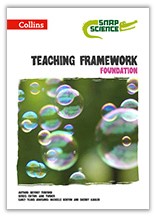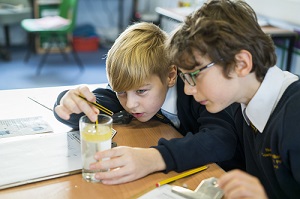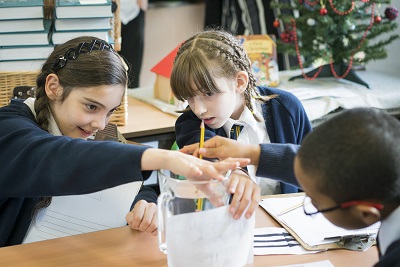 British Science Week, a ten-day programme of science, technology, engineering and maths events and activities across the UK for people of all ages, begins on 10th March. How will children, staff and parents at your school be taking part?
British Science Week, a ten-day programme of science, technology, engineering and maths events and activities across the UK for people of all ages, begins on 10th March. How will children, staff and parents at your school be taking part?
Will they be going to one of the hundreds of public events organised by museums, theatres and science centres across the country? The choice is over whelming – from astronomy to zoology with all things scientific in between. Go to the British Science Association website to find out what is happening near you.
Or maybe you are planning to run your own School Science Week? Children love Science Weeks and Science Days, when the regular timetable is relaxed and every lesson is their favourite one – science! Of course British Science Week is the ideal opportunity to do this, but you can hold a School Science Week at any time to suit your school.
There is no one way to organise a School Science Week but usually they are made up of a combination of:
 Science visits: These can be anything from a trip to a Science centre or museum to a visit to a local garden centre, local business or farm to learn about how science is used in its day to day work.
Science visits: These can be anything from a trip to a Science centre or museum to a visit to a local garden centre, local business or farm to learn about how science is used in its day to day work.
Science visitors: Actors and science communicators can be booked to present a wide range of science shows, workshops and plays. Parents and other members of the extended school community who work or have expertise in a scientific area, from medicine to car mechanics, make excellent Science Week speakers (but be sure to give then some guidance about how long to talk for and how to make their talks interactive.)

‘Alternative’ science lessons: extended investigations that require children to apply their scientific knowledge and skills to solve problems and answer questions (see Snap Science extension lessons for good examples); challenges that involve children investigating scientific questions at home with their parents and carers (Snap Science Foundation Stage has examples of these); children from different classes working together to investigate scientific ideas and report their findings. The British Science Association website has lots of ideas and resources for activities, and the BBC Terrific Scientific and the Wellcome Trust Explorify campaigns include great science activities which will engage children, teachers and families.
School events for families: invite parents and carers into school to carry out science activities with their children (use Snap Science lessons, or see BSA website above for suggestions). This is a great opportunity for parents to learn about what happens in science lessons and spark their own curiosity about scientific phenomena.
A Science assembly: a great opportunity to share what has been happening during the week with the whole school; children can come ‘dressed as a scientist’ (a real one, not a cartoon version) and describe their job.
 A scientific theme: this year the theme for National Science Week is ‘change’, which offers many opportunities for science
A scientific theme: this year the theme for National Science Week is ‘change’, which offers many opportunities for science
learning and different types of enquiries. Children can investigate how materials change when heated, cooled or mixed, how circuits behave when components are changed and how plants change according to growing conditions. There are many more ideas on the BSA website, and lots of Snap Science lessons fit the change theme including the Our Changing World module in each year group.
There is no doubt that Science Weeks are motivating, enriching and great science learning experiences for all concerned. Enjoy British Science Week – and your own School Science week, and use what you learn from it to make sure that every week in your school is a Science Week!
Jane Turner
Snap Science Series Editor
Join us to celebrate British Science Week, with FREE lesson plans, a giveaway and Twitter chat! Find out how you can get involved here.
Cultivate a spirit of enquiry in your pupils with Snap Science, practical exploration and investigation activities to inspire the whole class.




